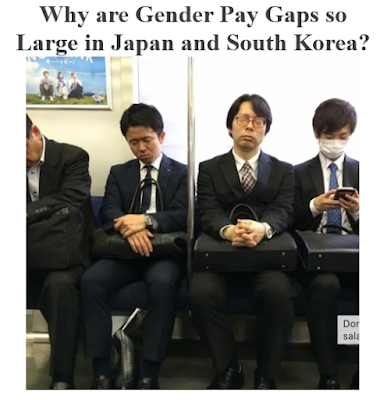Vì sao lương của phụ nữ Hàn Quốc thua xa đồng nghiệp nam giới?
do quan điểm, và hệ thống tuyển dụng trọn đời ở nước này, và các công ty cũng rất phân biệt đối xử: nam giới được coi là nhà lãnh đạo tương lai, phụ nữ chỉ là cấp dưới của họ
-> chán nản, phụ nữ bỏ việc làm thường xuyên, để dành nhiều thời gian cho con cái, và làm những việc không thường xuyên, ít tiền...
-----
Singapore, Hong Kong and Taiwan are closing gender gaps in pay, seniority and parliamentary representation (đại diện quốc hội). Japan and South Korea, meanwhile, have the largest gender pay gaps (khoảng cách lương theo giới lớn nhất) in the OECD. Management (quản lý) remains 85% male. Female graduates are treated like secretaries (thư ký), expected to pour the tea and run errands (rót trà và chạy việc vặt).
In Japan, a female graduate earns the same as a man who has only completed school. For Korean women aged 25-39, gender gaps in wages are indistinguishable between those with children and those without. In Europe, by contrast, there is a major penalty for motherhood (hình phạt cho việc làm mẹ).
Japanese businesses have lobbied again legislative change, even refusing sexual harassment training (đào tạo quấy rối tình dục). Courts routinely deny systematic discrimination. Employers cannot even be sued for sexual harassment. Employees can only ask the Ministry of Labour for mediation (hòa giải). Accusations of abuse are mostly ignored (bị ngó lơ).
At least part of the explanation stems from the lifetime full employment (việc làm suốt đời) norms of Japan and South Korea, not present in Taiwan or Singapore, where those wage gaps are lower.
To summarise, Japan and South Korea have enshrined (được cất giữ) a system of lifetime employment and seniority pay for both blue collar and white collar workers. Firms are extremely sexist: men are treated as future managers, women are their subordinates. These inequalities are largest amongst low status regular workers. Fed up and frustrated, wives quit regular work to spend more time with their children and undertake non-regular, low paid work.
source: draliceevans,



Post a Comment